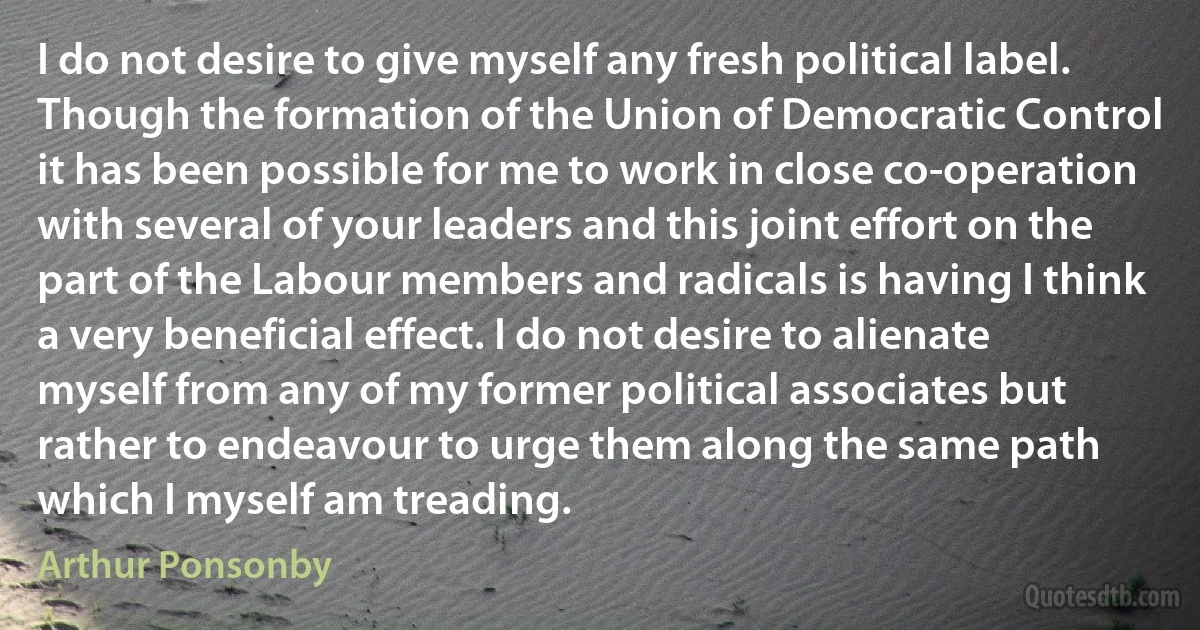Former Quotes - page 33
Traditional leadership is based on ascription. In former times, there was some degree of flexibility which enabled change. This was based on prowess in war and statecraft. The British fossilised the system and traditional leaders became government functionaries. Their authority was strengthened by the colonial administration.

Joni Madraiwiwi
I should make it clear that we do not accept that Britain has a special responsibility to meet the costs of land purchase in Zimbabwe. We are a new government from diverse backgrounds without links to former colonial interests. My own origins are Irish and, as you know, we were colonised, not colonisers.

Clare Short
The circumstance-adaptive law, operating upon the slight but continued natural disposition to sport in the progeny (seedling variety), does not preclude the supposed influence which volition or sensation may have over the configuration of the body. To examine into the disposition to sport in the progeny, even when there is only one parent, as in many vegetables, and to investigate how much variation is modified by the mind or nervous sensation of the parents, or of the living thing itself during its progress to maturity; how far it depends upon external circumstance, and how far on the will, irritability and muscular exertion, is open to examination and experiment. In the first place, we ought to investigate its dependency upon the preceding links of the particular chain of life, varieties being often merely types or approximations of former parentage; thence the variation of the family, as well as of the individual, must be embraced by our experiments.

Patrick Matthew
In Mongolia has been discovered a mass grave containing the remains of thousands of Buddhist monks liquidated by a former communist regime. An 83-old man, once head of an extermination squad, admitted that he personally put 15,724 to death. 1197-at-Nalanda was repeated not by invading Muslim armies but by local communist revolutionaries and social transformers.

Ram Swarup
Compare Holland with Russia; you see only marshy and sterile islands in the former, which rise from the center of the ocean: a small republic which is only 48 miles length by 40 wide. But this small body is the very nerve-center of the region: immense people live in it, and these industrious people are both powerful and rich. They shook the yoke of the Spanish domination, which was then the most formidable monarchy of Europe. The trade of this republic extends to the ends of the world; and new trade appears almost immediately; it can maintain in times of war an army fifty thousand men, without counting a many and well maintained fleet.

Frederick II of Prussia
The Semitic religions are not religions in the Eastern sense of the term. Their thrust is towards outward expansion, not towards inward exploration. In fact, in the Eastern sense, they are not spiritualities, but are what Marx calls ideologies, tailored for political expansion and imperialist aggression. The two systems -Eastern and Semitic- differ widely in their outlook, perspective and approach. The former speaks in the language of Self or Atma, the latter in the language of external Gods; the former speaks of the Law, the rita, the inner, spiritual and moral law of being and action, the latter speak of Commandments of an external being. The two differ also in their concept of the deity. The god of Semitic religions is "jealous”; he can brook no other gods. He is the sole Lord of the world; therefore, he marches at the head of an army of believers to lay claim to his domain. Those who oppose him are rebels.

Ram Swarup
Every living thing is a sort of imperialist, seeking to transform as much as possible of its environment into itself ... When we compare the (present) human population of the globe with ... that of former times, we see that 'chemical imperialism' has been ... the main end to which human intelligence has been devoted.

Bertrand Russell
There is a U.S. press campaign suggesting that people should not be afraid of the communists; that they are good, honorable and kind people. I warn people not to believe this. More than half of them are
fanatics; they would destroy everything. It would mean civil war. They would abolish the boundaries between the republics (of the former Soviet Union). They want to take back Crimea; they even make claims against Alaska.

Boris Yeltsin
There was no time during the rebellion when I did not think, and often say, that the South was more to be benefited by its defeat than the North. The latter had the people, the institutions, and the territory to make a great and prosperous nation. The former was burdened with an institution abhorrent to all civilized people not brought up under it, and one which degraded labor, kept it in ignorance, and enervated the governing class. With the outside world at war with this institution, they could not have extended their territory. The labor of the country was not skilled, nor allowed to become so. The whites could not toil without becoming degraded, and those who did were denominated 'poor white trash.'

Ulysses S. Grant
There was no time during the rebellion when I did not think, and often say, that the South was more to be benefited by its defeat than the North. The latter had the people, the institutions, and the territory to make a great and prosperous nation. The former was burdened with an institution abhorrent to all civilized people not brought up under it, and one which degraded labor, kept it in ignorance, and enervated the governing class.

Ulysses S. Grant
How then to enforce peace? Not by reason, certainly, nor by education. If a man could not look at the fact of peace and the fact of war and choose the former in preference to the latter, what additional argument could persuade him? What could be more eloquent as a condemnation of war than war itself? What tremendous feat of dialectic could carry with it a tenth the power of a single gutted ship with its ghastly cargo?

Isaac Asimov
Every now and then a man's mind is stretched by a new idea or sensation, and never shrinks back to its former dimensions. After looking at the Alps, I felt that my mind had been stretched beyond the limits of its elasticity, and fitted so loosely on my old ideas of space that I had to spread these to fit it.

Oliver Wendell Holmes Jr.
I am fond of history and am very well contented to take the false with the true. In the principal facts they have sources of intelligence in former histories and records, which may be as much depended on, I conclude, as anything that does not actually pass under ones own observation; and as for the little embellishments you speak of, they are embellishments, and I like them as such.

Jane Austen
If space in infinite, how about the space inside man? Blake said that eternity opens from the center of an atom. My former terror vanished. Now I saw that I was mistaken in thinking of myself as an object in a dead landscape. I had been assuming that man is limited because his brain is limited, that only so much can be packed into the portmanteau. But the spaces of the mind are a new dimension.

Colin Wilson
The human understanding when it has once adopted an opinion (either as being the received opinion or as being agreeable to itself) draws all things else to support and agree with it. And though there be a greater number and weight of instances to be found on the other side, yet these it either neglects and despises, or else by some distinction sets aside and rejects, in order that by this great and pernicious predetermination the authority of its former conclusions may remain inviolate.

Francis Bacon
This is the dialectic of Christian thought: God enters into the social context of human existence and appropriates the ideas and actions of the oppressed as his own. When this event of liberation occurs in thought and praxis, the words and actions of the oppressed become the Word and Action of God. They no longer belong to the oppressed. Indeed, the word of the oppressed becomes God's Word insofar as the former recognize it not as their own but as given to them through divine grace.

James Hal Cone


![The most important things in my life have been being governor of Puerto Rico and eliminating the old tradition that was established by [former Gov. Luis] Muñoz himself of being a boss. He was the boss of the government and there was no opposition in Puerto Rico. That was the thing I broke to make Puerto Rico a two-party system, a truly democratic society. (Luis A. Ferré)](https://cdn.quotesdtb.com/img/quotes_images_webp/21/luis-a-ferr-boss-519121.webp)
